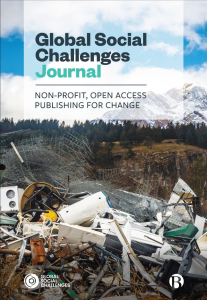Most cities worldwide face growing challenges such as social and economic exclusion, transport accessibility and educational inequalities. Even though cross-sectoral partnerships have shown great potential for addressing complex sustainability challenges, leveraging coordinated action is difficult.
The Sustainable Development Goals (SDGs) have emerged as an increasingly popular approach to engage local stakeholders in addressing local challenges. But how can global goals, such as the SDGs, be localised in an inclusive and participatory manner when they seem so vague and generalised?
The city of Bristol, a mid-sized city in the UK, has a reputation for being a frontrunner in this area. Bristol is a very diverse and divided city, with many green initiatives existing alongside enduring social division and poverty. The city administration is struggling with the challenges common to managing change in a pluralistic context, including budgetary constraints and aligning multiple imperatives with short delivery dates. What sets Bristol apart is that it has developed a ‘One City‘ approach for multi-organisational collaboration for sustainability.
In 2015, a year before the current Mayor was elected, the city was celebrating its European Green Capital year, and the UN was launching the SDGs. The current Mayor’s election for the Labour Party led to a greater focus on tackling persistent social inequalities in a very divided city. The change in administration was also accompanied by a shift towards opening up participation in city planning to a wider audience through the ‘One City’ planning approach. This approach involves multiple organisational stakeholders and is supported by a dedicated City Office and several cross-sectoral boards to support achieving the goals agreed upon in the ‘One City’ plan, which are mapped against the SDGs. The first Voluntary Local Review (VLR) was published in 2019, following the mapping of the SDGs against the local One City plan by academics from the University of Bristol working closely with the City Council.
Over time, we think that the SDGs have become part of common stories about change within the city. For example, Bristol City Council has been working in partnership with UN-Habitat, Nesta Challenges and the Bristol Housing Festival to advance the development of affordable and sustainable housing. Another example is the engagement of communities in the development of community climate action plans, in a project coordinated by the Bristol Green Capital Partnership and supported by the National Lottery Climate Action Fund. The co-produced plans tackle cross-cutting SDG challenges, including fuel poverty and sustainable consumption.
Reflecting on this process, the SDGs appear to have moved from being seen as a set of worthy but abstract goals constructed in response to global challenges towards becoming locally meaningful. By weaving them into the narratives about locally important actions and establishing a progress measurement capability, the SDGs appear to have been leveraged to enhance the local capacity for partnership working. But what does this tell us about the dynamics of SDG localisation?
Bristol’s experience highlights the importance of supporting sensitive learning processes that help make the SDGs relevant locally. This is not the unidirectional implementation of the goals but rather a Bristol-driven ambition to deliver partnership-working for social, economic and environmental sustainability. Indeed, many cities appear to have in common this engagement in making the SDGs locally real, relevant, relatable and relational, even though the paths they take to develop the capacity to participate in Voluntary Local Reviews and similar processes may differ.
In our case, the SDGs appear to offer a shared language that can enable coherence between the different views and interests involved in localising the SDGs in cities, and hence help to form and maintain partnerships for change. Even if actors do not agree on what they mean in detail, they have a shared object to orient themselves towards. This becomes a recognised enabler for strategic change and for sustaining cross-sectoral partnership working. In Bristol, using the SDGs seems to help support strategic change in pluralistic settings and ultimately to develop locally innovative approaches to governing a transition towards fairer, healthier and more sustainable cities.
By leveraging the SDGs’ ambiguity and vagueness in this way, cities may become more skilled in integrating the ideas and interests of multiple actors. Still, there are many questions about linking the international policy ambitions, that gave rise to the SDGs, to local urban practices. The SDGs cannot be achieved without the full integration of different levels of government in their implementation, monitoring and evaluation. What happens in Bristol is not only determined by actors in Bristol, and so we can never ignore questions of power in sustainability transitions that lie beyond the city’s boundaries.
Kat Burger is Senior Lecturer in Management and Martin Parker is Professor of Organisation Studies, both at the University of Bristol.
 Leveraging the Sustainable Development Goals as a boundary object in the City of Bristol by Katharina Burger and Martin Parker. Published Open Access on Bristol University Press Digital.
Leveraging the Sustainable Development Goals as a boundary object in the City of Bristol by Katharina Burger and Martin Parker. Published Open Access on Bristol University Press Digital.
Bristol University Press/Policy Press newsletter subscribers receive a 25% discount – sign up here.
Follow Transforming Society so we can let you know when new articles publish.
The views and opinions expressed on this blog site are solely those of the original blog post authors and other contributors. These views and opinions do not necessarily represent those of the Policy Press and/or any/all contributors to this site.
Image credit: Harry Kessell on Unsplash


